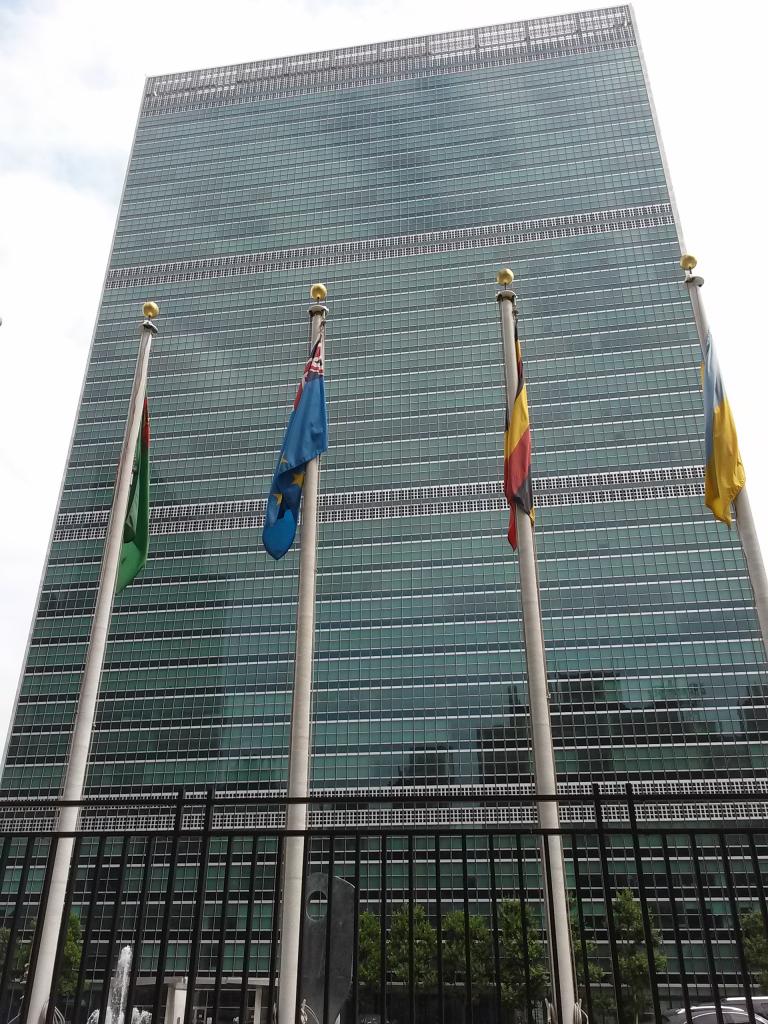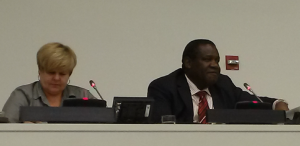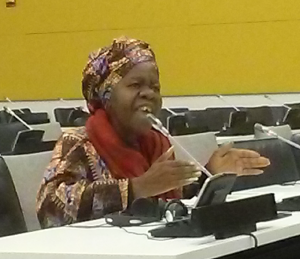EDITOR’S NOTE: On Monday, July 14, an Informal Consultation was held at the United Nations in New York City to discuss the upcoming International Decade for Peoples of African Descent (January 1, 2015 – December 31, 2024). The following is an account and analysis by one of the attendees at that consultation, Sis. Dòwòti Désir, Founder and President of the DDPA Watch Group, www.ddpawatchgroup.info. She can be reached at ddpawatchgroup@gmail.com.
The International Decade for People of African Descent: Had? Took? Hoodwinked and Bamboozled?
By Dòwòti Désir
Over the past few weeks important meetings with the Intergovernmental Working Group (IGWG) have been occurring at the United Nations both in Geneva and the UN’s New York Headquarters concerning the UN International Decade For People of African Descent 2015-2024. A series of challenges face civil society, most notably a lack of openness and transparency concerning key issues that impact our immediate processes of engagement and our lives in the coming decade and beyond. While those members of our social movements and civil society as a whole with the means and resources to attend the various consultations in Geneva did so, not without effort, the situation in New York has been extremely problematic. With an abruptly announced teleconference call on 3rd July compounded with technical issues; closed governmental consultations on 7th July; inadequate notification of an informal consultation for civil society on 14 July; and an Ambassador (His Excellency Kingsley Mamobolo of South Africa) not fully briefed on the complex history of the Durban Declaration & Programme of Action Plan (DDPA), one wonders if the Decade isn’t on the verge of being had, took, hoodwinked and bamboozled? The exclusion of related or parallel documents submitted by the Working Group of Experts of People of African Descent exacerbates our collective ability to access all documents, respond and/or contribute to their outcome. Democratic participation has in short been subverted.
As no formal minutes were taken during the informal consultation of 14 July (or presented to meeting participants afterwards), I have complied my notes from that meeting to share with those unable to attend. My editorial comments are sprinkled through-out and were originally crafted the day of the meeting; they have since been modified or edited so they read more clearly:
July 14, 2014: This is an informal summation of what transpired today at the UN Informal Consultations for the International Decade for People of African Decent. [My apologies for not writing or translating my observations in French, Spanish or Portuguese.] The proceeding that took place today was as informal as possible and conducted in English only with no translations available for attendees. There were NO documents circulated and I am not even certain if there were any UN personnel taking notes. An underwhelming meeting, only a total of 36 people were in attendance. For most of the session the microphones and video were not functioning. It began at around 15:07 (3:07 pm) and ended at 17:18 (5:18 pm) Eastern Time (US).
H.E. Ambassador Mamobolo very briefly shared some of his own background on this project but really began the meeting discussing concerns raised during the 3 July teleconference call stating that Geneva is working on translating the document presented to us recently in Portuguese, Spanish and French. He made some reference to the website that would be used to keep civil society abreast of activities in the various languages. He iterated the International Decade for People of African Descent runs from January 1, 2015 to December 31, 2024 with the theme of Recognition, Justice, and Development. He mentioned the IGWG had three principal areas of disagreement:
1) A Forum for African Descendants requires monitoring and so certain practical questions were raised: What would be the financial implications of such a forum? Where will the money come from for the Forum or various fora?
2) There is already a Permanent Forum for Indigenous People so why do we need one for African Descendants?
2a) He mentioned parenthetically there is a UN Declaration for People of African Descent at issue.
3) Acknowledging the need for Reparations is a problem in the negotiations of the IGWG. He cited the example of his country of South Africa and the challenges they faced there.
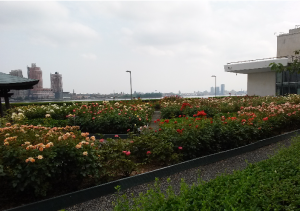
The UN Peace Garden.
The Ambassador also talked about announcing the Decade at the end of the U.N. General Assembly debates to take advantage of the presence of as many Heads of State as possible. (The body language of most people in the room seemed to agree with this rationale but this is subject to debate among us as civil society.) This is the essence of the summation provided by the Ambassador. I was struck by the brevity of his remarks, and his lack of familiarity on various issues that frame the International Decade, namely those of the Durban Declaration (from the 2001 World Conference Against Racism in Durban, South Africa). While I questioned the extent to which he could act as an effective advocate for us, I later learned the Ambassador has, however, only been in this position for roughly a year. His effort to meet with civil society was nonetheless greatly appreciated.
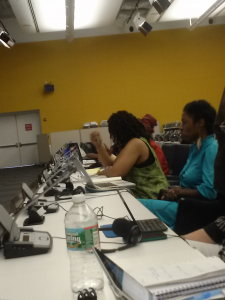
Some of the participants at the UN Consultation.
When the Ambassador concluded his remarks, questions and comments from the floor were opened up. These are the issues raised:
- ♦ The first speaker suggested the Ambassador should consider use of the World We Want 2015/My World Campaign to get the word out about the consultations and to bring greater transparency to this process.
- ♦ Sister Gayle MacDougal introduced background about the DDPA and negotiation processes and suggested the current group (IGWG) represented by the Ambassador learn something about the negotiation processes and the issues raised at the table from the DDPA. She also noted gender based issues are not addressed within the document — and that must change.
- ♦ I spoke next and attacked the 3 points made by the Ambassador, framing my objections within the context of “Black or African Descendant Exceptionalism,” namely: 1) there is always money available for other fora EXCEPT those of African Descendants. 2) Other fora may exist EXCEPT those of African descendants. My intervention made it clear that for a variety of reasons (which are on some level incomprehensible) African descendants are NOT considered Indigenous People so that the Permanent Forum for Indigenous Peoples does not address our issues and concerns. This fact needs to be made clear to those who assume they are one and the same. And finally 3) a crime against humanity was committed which allows for reparations — why is every victim of such a crime allowed reparations EXCEPT African descendants? In conclusion, I spoke of the necessity to use the word “Reparations” because reparations is beyond a financial issue but a moral, scholarly/academic, scientific, social and economic one. International Criminal Tribunals exist for these matters. Referencing the failure to acquire reparations in South Africa that he made mention of earlier, I observed (for better or worse) in South Africa there was at least a Truth and Reconciliation Commission and we are not even being afforded that as a tool of redress as Afro-descendants. I also shared that as a Haitian Vodou Priest who works with other priests of the AfroAtlantic traditions, everyday we are confronted with the trauma of African descendants based on the Transatlantic Slave Trade (Maafa) and its continued impact on the psyche, so reparations are needed. I finally stated that from a legal perspective the absence of the word “reparations” has implications. Without calling perpetrators to task — making them liable for their actions — what assurances do we have that this crime against humanity cannot happen to us again or to another group of people, if the violators are not held accountable? I cited that even if symbolic, the word “reparations” must be applied in the outcome document to facilitate our ability to be seen and view ourselves as fully recognized human beings.
- ♦ Dr. Waldaba Stewart made the lack of proper introductions an issue.
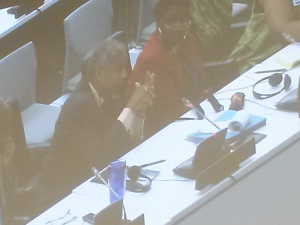
Dr. Waldaba Stewart and Esmeralda Brown.
Noting that we didn’t even know who was in the room with us, protocols were being breached. He basically said that if openness and transparency were not adapted to these proceedings he would lead a boycott or demonstration right outside the doors of future proceedings.
♦ A Black psychologist called for the use of more precise language within the document. She advised us, within the psychiatric profession, racism is diagnosed as a “toxic stressor.” Use of such language is critical to make its impact on African Descendants clear. That term, “toxic stressor”, should appear in the documents related to the International Decade. She noted the word “disparities” was absent (in education, health, housing etc.) and must be used in the document; and finally, “children” must be referred to in the text, to mitigate the emotional and mental health of another generation of traumatized African descendants.
♦ Another person (an educator) who underscored all that was said before her began to outline specific language and recommendations for addressing the matters raised on Page 6 Section C of the declaration document of the International Decade, regarding Education. She underscored the need for African-centered education, taught by African descendants for African descendants. She also indicated this should start at primary and secondary schools. The South African Ambassador responded that the specifics of education, housing, employment and the like would be presented to the Office of the High Commission on Human Rights and they would in turn speak to various UN agencies like Habitat for Humanity and UNESCO to address what modalities or mechanisms could be implemented to resolve the matters raised. (In my estimate, we should keep in mind these agencies have limited funds to make anything happen for our community, and some like UNESCO have been fighting very hard with the General History of Africa to make its contents more accessible to all, yet the battle continues.)
♦ Other matters articulated from the floor had to do with the lack of transparency and openness in the proceedings; greater inclusion of the NGO community; how is the term African Descendant being defined — is it just a reference to the Diaspora? Are Africans born on the continent included, etc.? Attorney Roger Wareham made a point of stating the concerns of the International Decade and its historical framework are Pan African issues so that the global African community is included by the term “African Descendant.”
♦ The issue of reparations was bought up several times, especially by Queen Mother Dr. Delois Blakely, known as the “Community Mayor of Harlem”.
♦ Sister Esmeralda Brown and a young Sister named Shantrelle Williams (who was in Geneva on an internship over the summer) spoke about the Working Group of Experts of People of African Descent and observed how their programme of action was NOT incorporated in the IGWG document. This exclusion, they repeated, was a source of confusion. (At this juncture, it became apparent the presiding Ambassador was somewhat unfamiliar with the larger workings of these proceedings and the potential for conflict with the Working Group meeting as they were occurring at the same time as the IGWG). We tried to get the point across to him that the language of the Working Group of Experts must frame the IGWG document and the Programme for the Decade.
♦ Her Excellency Rhonda King, an Ambassador from St. Vincent’s (representing CARICOM) spoke about the need for us to be strategic in our work because the governments who DO NOT want to see reparations are powerful and have many resources. We must be strategic, she cautioned.
♦ Others repeated this point but I pointed out that we have experts among us (a point made earlier by Sister Esmeralda Brown during her intervention), reminding all present that we have had elders involved in this process for decades so at this point we must assume that they have been strategic about matters, but what we also seek is agency. I mention two small things that could be done to facilitate acquisition of said agency: A) Taking advantage of the presence of the Heads of State by recommending they present letters of support for the International Decade for Peoples of African Descentso that they might also be held accountable and, we could leverage the support secured. B) To allow NGO’s at least one hour to make a presentation before the representatives of the Member States so that they hear our unfiltered voices directly. I closed by asking that we consider at the earliest occasion, identifying the next meeting date for consultations.
♦ The need for assessment reports during the Decade was also raised by a couple of people from the floor, including members of PANASTRAG.
♦ Brother Cliff, representing the Sixth Region Diaspora Caucus, spoke of the intersectional elements of the goals of the International Decade and key objectives of the African Union that helped to underscore some important subtle points made earlier.
♦ And finally, Brother Amilcar Priestley, Director of the Panama-based AfroLatino Project and one of the few youth attendees at the meeting, rightly called attention to an absence of reference to technology in the document presented by the IGWG. He emphasized how access to digital technology is a critical imperative, if that divide and the many other disparities faced by African descendants are to be closed. Digital technology affects our abilities to meet the goals of the International Decade for People of African Descent.
In conclusion the Ambassador reiterated key points made from the floor to make certain we understood that he heard our urgent requests and expectations. He of course made no promises, simply noting that he would relay our points back to the powers that be. He also emphasized that consultations should occur throughout the Decade, not just now and in September. Ambassador Mamobolo is apparently only acting in this capacity until September. I would urge we provide him with all the necessary tools needed to understand the history and nature of our collective struggle. He must be encouraged to be our advocate and not merely serve as a messenger of civil society during the IGWG consultations. It is also crucial he and CARICOM understand that the right to reparations is a non-negotiable matter. No one has the right to take the matter off the table unless each and every one of us as African descendants on all continents determines that is the case. So long as even one person (of the hundreds of millions of us) of African descent demands reparations the matter must remain on the table. We must NOT stand down! We shall not be had, taken, hoodwinked or bamboozled.
To that end, I encourage all reading this summation, to send CARICOM letters of encouragement, appreciation and support regarding the work they are doing on our behalf. CARICOM must know how strongly we feel, as they are our true voice in this matter of the Decade and our Reparations (from a governmental perspective). Finally,if everyone is able to blog, write an article, go on radio, or speak to the press in your communities about the aims of the upcoming Decade, Reparations and challenges we face — then please do so. I recommend using Google Hangout or Skype to host meetings to promote greater public awareness and dialog, if organizing in-person meetings is not an option. These on-line tools are vital as we organize globally with limited funds. No effort to mobilize our communities is too small. Some of us learned the hard way that our governments WILL NOT fight for us as global African people so let us represent and fight for ourselves using whatever means necessary.
La lucha continua!! Asé.
In solidarity,
Dòwòti Désir
Founder & President
DDPA Watch Group
www.ddpawatchgroup.info
ddpawatchgroup@gmail.com
Sister Dòwòti Désir founded the DDPA Watch Group in 2009. She is the former Executive Director of the Malcolm X & Dr. Betty Shabazz Memorial, Educational and Cultural Center at the historic Audubon Ballroom, and is the author of Goud kase goud: Conjuring Memory in Spaces of the AfroAtlantic, a photo-journal of the monuments, memorials and historic sites of the Maafa.

